Storm Arwen: Why power cuts left people unable to phone for help
- Published
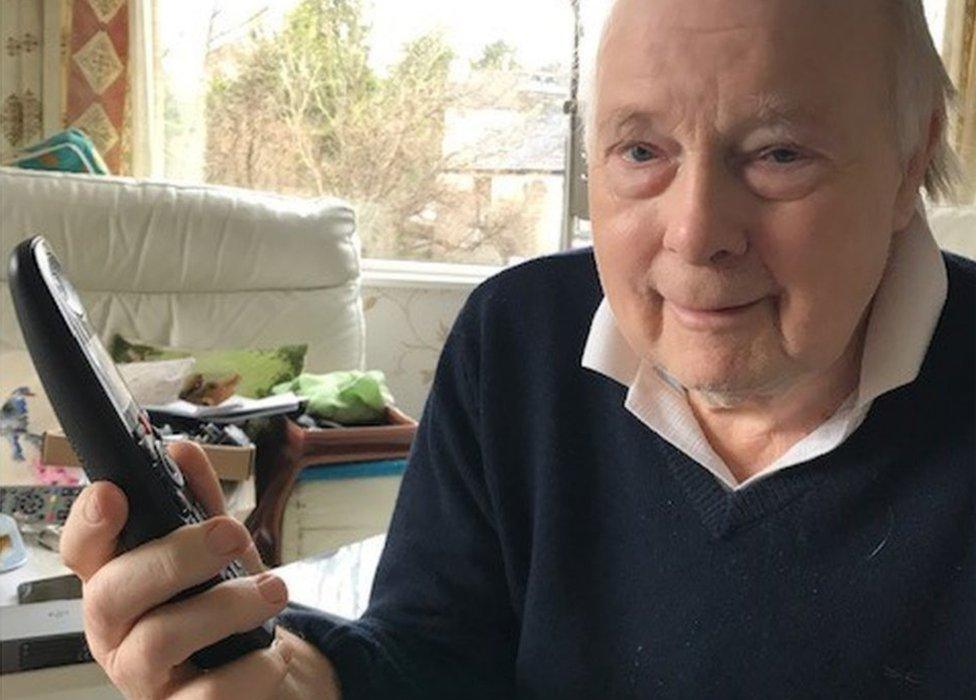
Jim Bownass, 74, could not make a phone call for a week when his electricity went off
Power cuts caused by Storm Arwen have highlighted a potentially lethal problem in the home phone network's digital transformation. Traditional landlines are being phased out in favour of broadband-enabled phones reliant on electricity. As hundreds of thousands of households across northern England lost power, people in remote areas without a mobile reception were left unable to call for help.
"There was no way of getting hold of anybody," says 74-year-old Jim Bownass, who lives in the small village of Crosthwaite, near Kendal, in the Lake District.
When Storm Arwen took out his electricity on 26 November he was left with "no communication with the outside world whatsoever". No way of calling for an ambulance, no way of asking for less urgent help and no way of talking to his power company.
His 84-year-old neighbour was in the same quandary: "Her phone is exactly the same as mine, one of the new digital phones from BT, and nothing worked."
Under the old landline system - the Public Switched Telephone Network (PSTN) - home phones still function in a power cut (unless the lines themselves come down) because the exchange has back-up power which feeds to the phone through the line itself.
But this system is being switched off in 2025 and BT Openreach, which manages the UK's phone and internet network, has already begun moving people over to Voice Over Internet Protocol (VOIP) connections, which work through broadband.
Mr Bownass's phone line had worked "perfectly" for the 50 years he has lived in his house, he says, but he switched to VOIP three months ago. The power cut knocked out his landline for a week.
BT, and the industry regulator Ofcom, say PSTN equipment is becoming harder and more expensive to maintain and new digital technology is needed to secure the future of our phone services.
But Storm Arwen has highlighted a number of problems with the new technology, and its rollout.
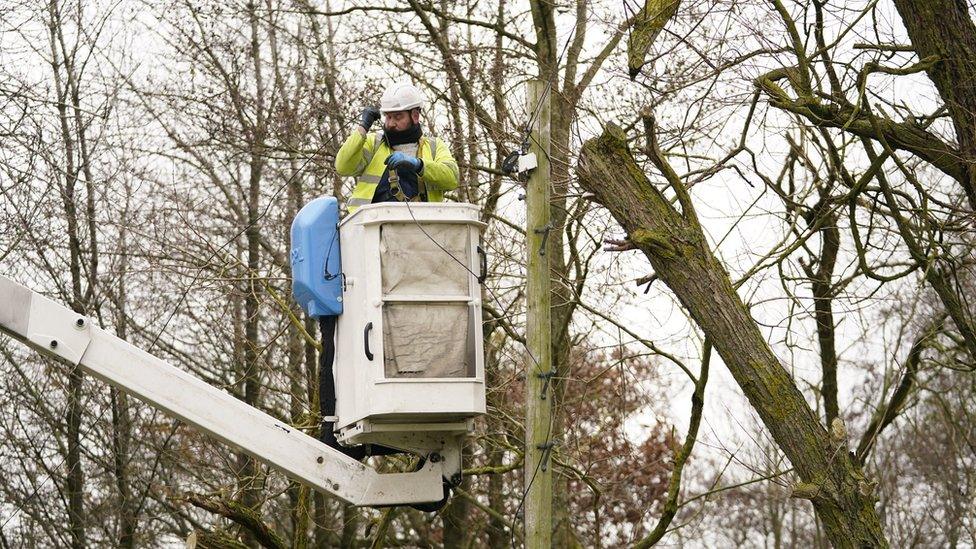
Engineers were fixing telephone lines near Barnard Castle as Storm Barra followed hot on the heels of Arwen
First, it does not work without power. Second, it does not work if the broadband connection fails. Third, guidance that people use mobile phones as back-up is redundant where reception is non-existent. Fourth, even where mobile reception is reliable, severe storms can damage masts or knock out their power supply.
In addition, charging a mobile phone during a power cut poses a challenge.
Moira McLean, who lives near Berwick in Northumberland, says struggling to load web pages on a bad mobile connection was "hellish with dwindling battery and no way of recharging".
"Coverage is pretty ropey here but was far worse that weekend, compounded by the fact I couldn't get my car out to search of a decent signal because the power cut knocked my garage doors out too," she says.
She feels having no phone in an emergency would be "life threatening".
'Frightening to live like this'
Greg Round from St John's Chapel in Weardale is also "seriously concerned about BT Digital Voice" as the power cut made him "realise how useless it is" without electricity.
"No-one in a rural area should be forced into having this until they have found a satisfactory way of backing it up," he says.
A petition calling on BT Openreach to discontinue the VOIP rollout in his area has more than 200 signatures.
Ann Hetherington, who lives in Northumberland, says her mobile signal was so poor and her broadband so slow she relied on a plug-in analogue phone for the eight days she had no power.
"Given how difficult it was to communicate with Northern Powergrid and Northumbrian Water, I would not have wanted to stand outside at the one point that we sometimes get a [mobile] signal," she said.
"It is frightening to live like this and not appropriate for the 21st Century."
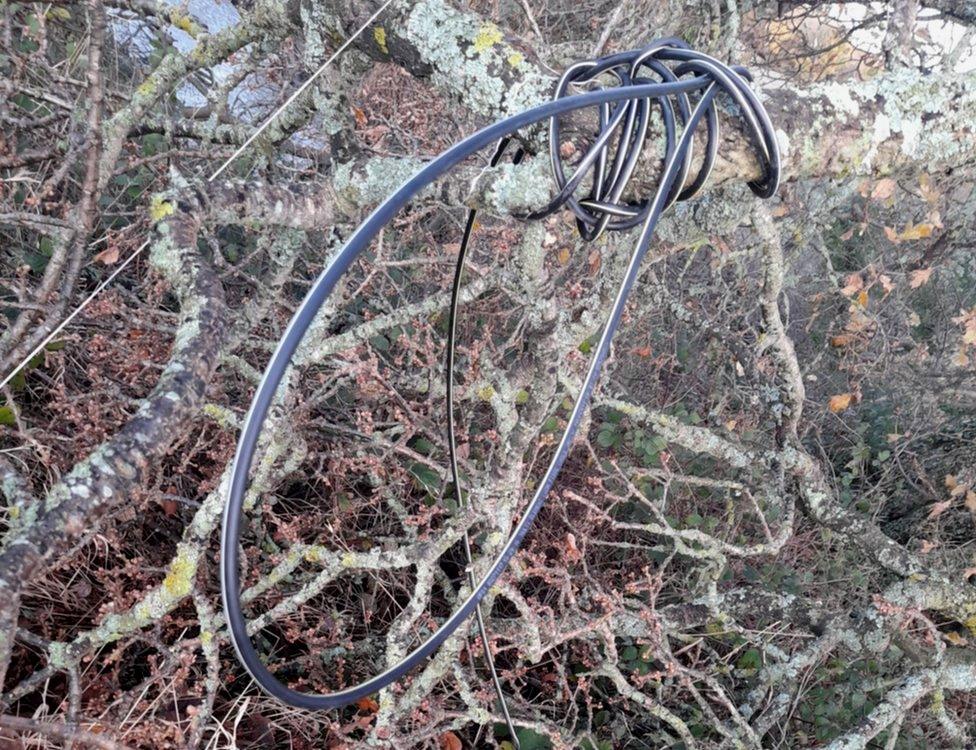
In some parts of Northumberland loose power cables wrapped round branches to be kept out of the way have become a common sight
The general secretary of the National Pensioners Convention, Jan Shortt, says the potential pitfalls with the new system "should have been much better thought through".
"Even if you've got a mobile phone, you've still got no electricity and you need to make sure your phone can be charged," she said.
"There are an awful lot of people across this country that don't know about this new system coming in."
Which? quoted a survey, external earlier this year which found 91% of UK adults did not know the digital switchover was coming and some have been transferred without appreciating what was happening.
Some, like Mr Round, say they were not given a choice.
Others, like Ms McLean, say they were not warned the new system would fail in a power cut nor were they offered the battery back-up as recommended by Ofcom, external for those in so-called mobile "not spots".
Mr Round was offered a battery but was told it would cost him £85. However, when he agreed to pay he was told they were out of stock.
The batteries are only free to people living in "not spots" prone to power cuts. Those, like Mr Round, who normally have mobile reception are not eligible.
BT says there is a global shortage of the back-up units and it will not move anyone who needs one onto VOIP until it can access more. It also says it makes it clear power cuts will render broadband landlines unusable.
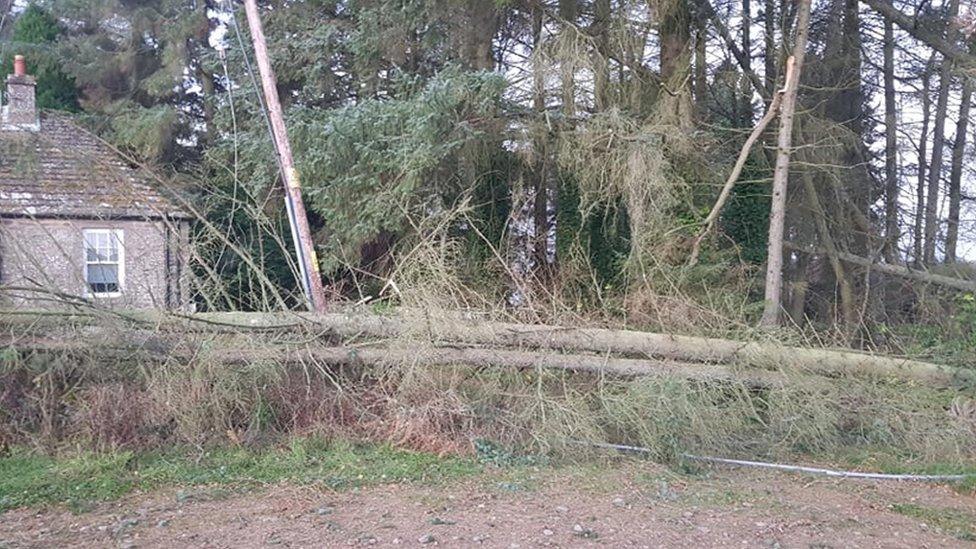
Storm Arwen brought down hundreds of trees, many taking out phone and power lines on their way down
For those who are offered back-up battery, there is the separate issue of how long it lasts.
Ofcom guidance is 24 hours on standby and one hour of talk time. But, in the regulator's report, external on protecting access to emergency services during a power cut, London Fire Brigade and the Communications Consumer Panel, external argued for a longer minimum talk time. The Joint Radio Company, external noted an emergency could occur far longer than an hour after the initial outage.
Speaking on the BBC's You and Yours in September, Lindsey Fussell from Ofcom said "an hour is about right because we know that the vast majority of power cuts in the UK last considerably less than an hour".
She did add that, in parts of the country where people typically have much longer power cuts, landline providers would have to offer a different solution, such as a longer-life battery.
However, the batteries are seen as a last resort. Both Ofcom and BT regard mobiles as the preferred back-up.
The regulator says its research shows 100% of households should be able to receive at least a 2G signal (the minimum needed to call 999) from at least one operator.
An emergency call will go through whichever network has reception, it says.
But Storm Arwen proved mobiles can also be vulnerable in extreme conditions.
Masts in areas like Westgate in County Durham and Rothbury in Northumberland failed, leaving people unable to make any calls at all - despite an Ofcom requirement that everyone should be able to call 999.
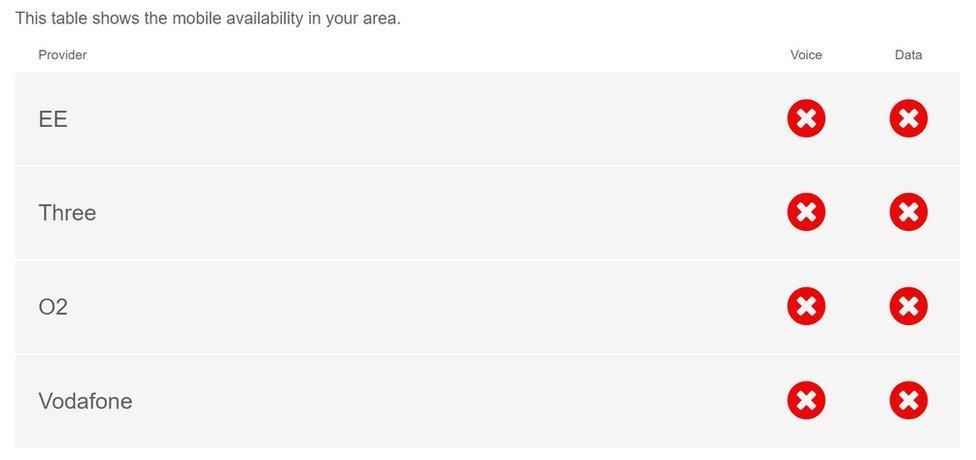
Ofcom says 100% homes have access to mobile coverage from at least one provider - but its postcode checker suggests not
One resident from Grizedale in the Lake District, who did not want to be named, said she struggled with weak phone signal "at the best of times". This was knocked out by the power cut, as was the wi-fi she uses to boost it.
"There was absolutely no signal in the whole of the valley for three or four days, and I couldn't drive up the hill to get one because the roads were all closed," she says.
Regular power cuts make it difficult for her to live and run a business when the communications system relies on electricity. "It's embarrassing that a supposedly world-leading country has such a shonky infrastructure," she says.
"I had full 4G in the mountains of Transylvania a few years ago."
Westmorland and Lonsdale MP Tim Farron says having no phone at all is "very dangerous for lots of people".
"Putting all your eggs in one basket isn't a good idea," the former Lib Dem leader says.
"If the power goes out and if you have no means of charging a phone then you're in trouble."
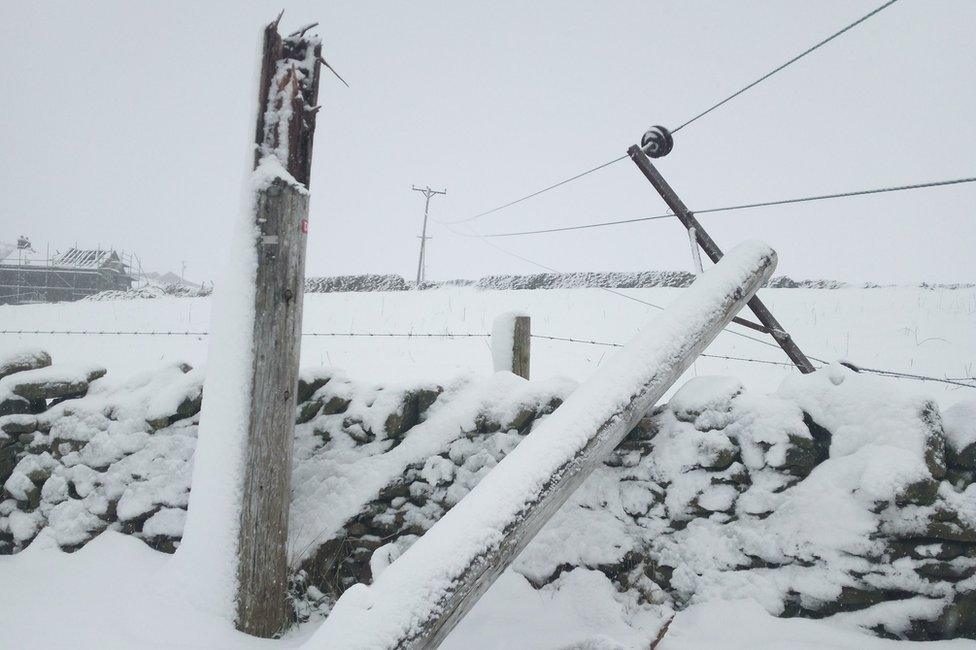
The Storm Arwen power cuts were compounded by heavy snow in parts of northern England
In Rothbury, Northumberland, three mobile masts serving EE, Vodafone and O2 all failed in Storm Arwen.
Steven Bridgett, the county councillor for the area, asks: "Why don't those masts have back-up generators?"
EE said it was deploying generators where it could and was "working with power companies to restore power" as soon as possible. Vodafone and O2 have been approached for comment.
BT says "very few people" would have no mobile reception and Ofcom did not expect providers to "predict and provide solutions for all exceptional circumstances".
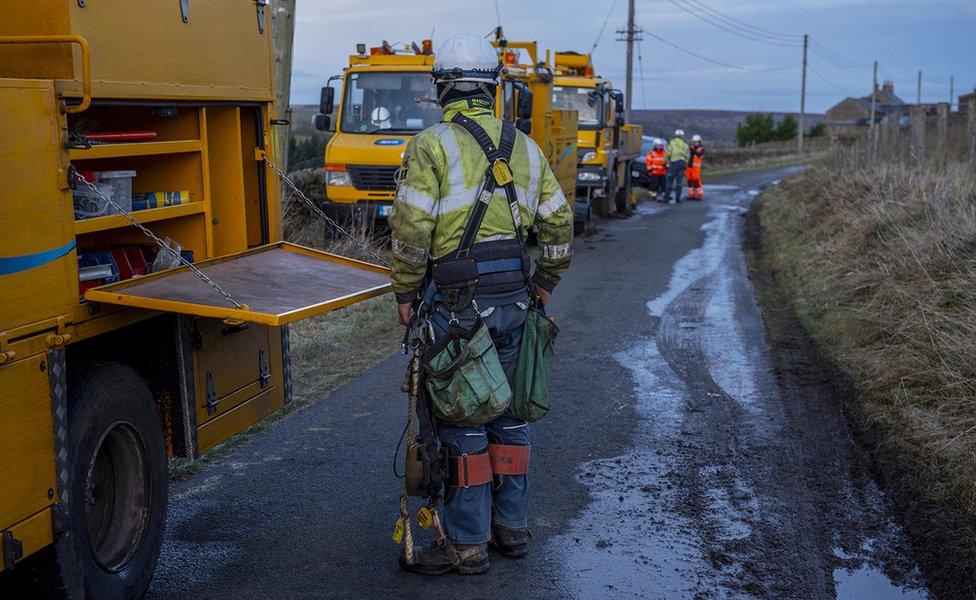
Engineers were drafted into the North East and Cumbria from across the country to reconnect supplies
When asked about those who were unable to make even 999 calls, a BT spokesperson said the damage caused by Storm Arwen had been "unprecedented and no phone or broadband provider could come up with a solution that would allow backup services to work for more than several days".
However, Ofcom says it recognises there may be exceptional circumstances where a normal level of service is not possible but "even in those circumstances, our rules are clear that there should be protections in place for people to call the emergency services".
Customers should be provided with "solutions that are appropriate for their needs", including greater protection for those living in an area "subject to regular power outages longer than an hour".
A spokesperson said the regulator was "in touch with BT to understand how they are meeting these obligations to these customers".
However, the obligation to provide 999 connectivity does not extend to a right to make any type of calls, such as to a power company or friend.
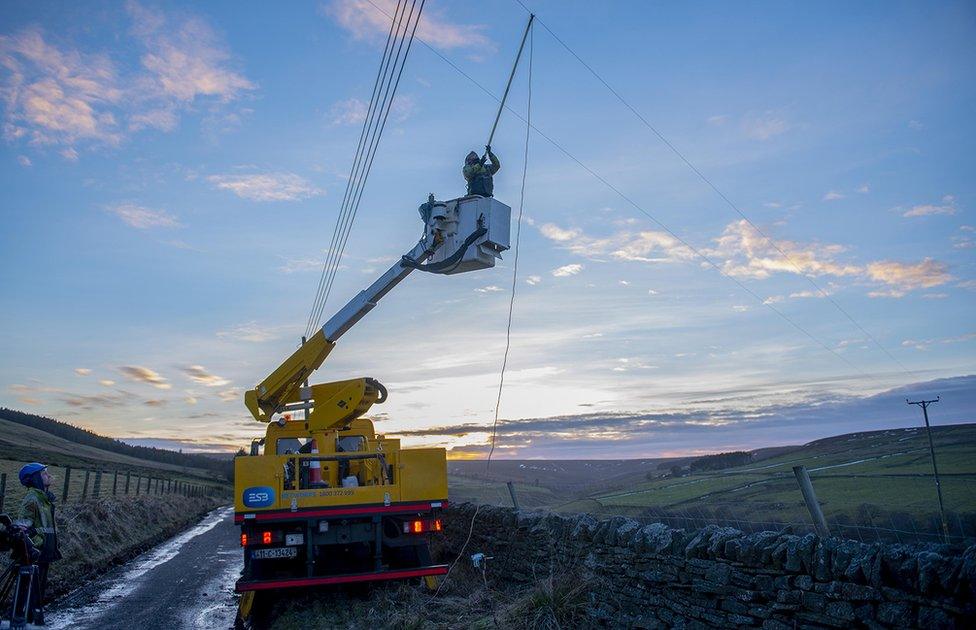
Northern Powergrid has said it will be the new year before all permanent repairs are complete
There is an irony, spotted by Mr Bridgett, that the green agenda is not taking into account the realities of weather associated with climate change.
Electric cars, air source heat pumps and the new digital landlines are all "useless in circumstances like this", he says. "The whole thing's an absolute joke in the aftermath of a storm like that."
He wants resilience built into utility infrastructure by the organisations responsible for it.
"That's what they're there for and what people pay their bills for."

Follow BBC North East & Cumbria on Twitter, external, Facebook, external and Instagram, external. Send your story ideas to northeastandcumbria@bbc.co.uk, external.
- Published16 August 2021

- Published10 December 2021
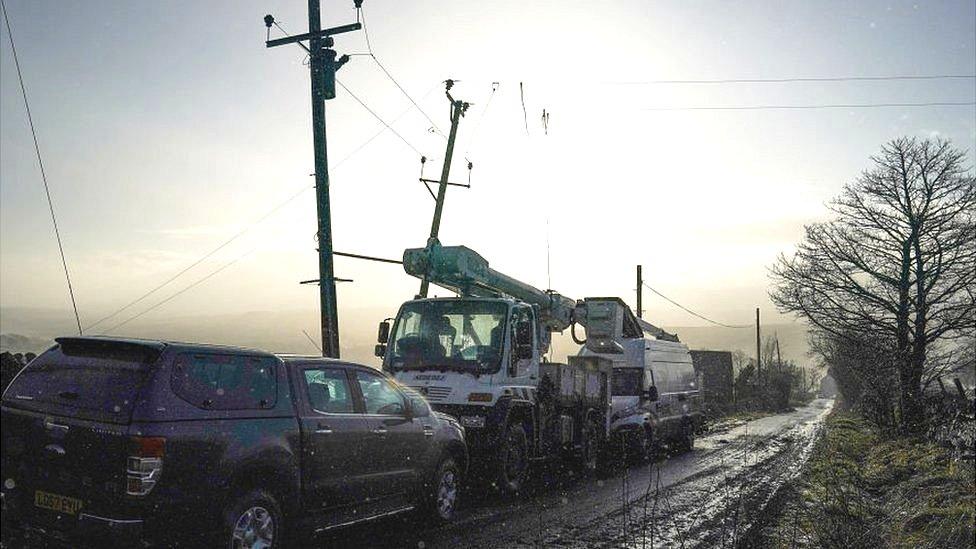
- Published8 December 2021

- Published2 December 2021
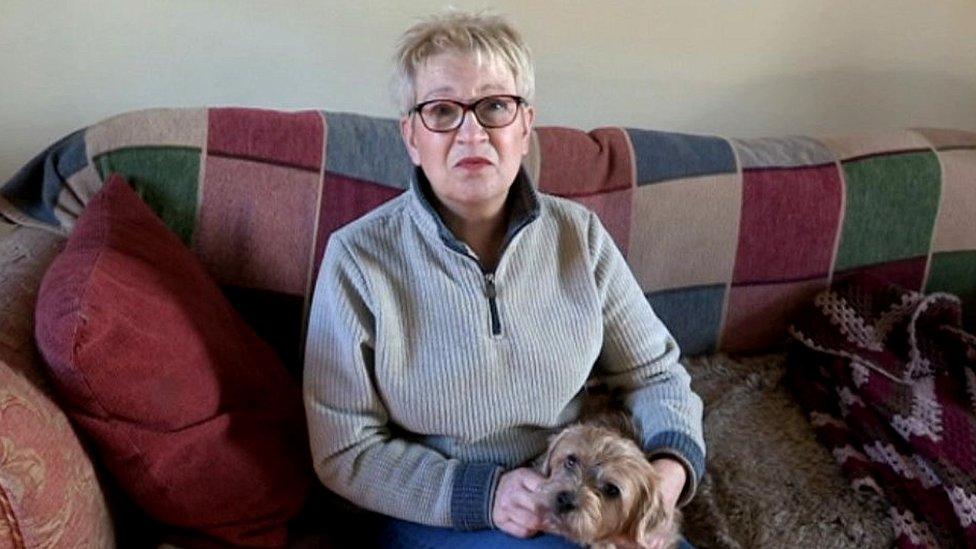
- Published6 May 2021
